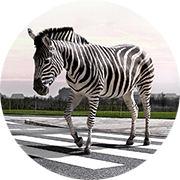| David Bertoni When you hear hoofbeats, think of horses, not zebras. Unless of course you are in Africa, in which case think of zebras and not the rare but majestic Namib Desert Horse... The zebra segment introduces the weird and unheard of, the MONA of posts...it's edutainment I thought I'd kick this thing off with a disease uncommon to both horses and humans, Hyperkalaemic Periodic Paralysis. |
So next time someone complains of general weakness or collapses and starts shaking, forget checking obs and start taking a family history instead, because you know what it will be. Unless of course, the potassium level is low, in which case it will be the counterpart condition, Hypokalaemic Periodic Paralysis. Seriously.


 RSS Feed
RSS Feed
